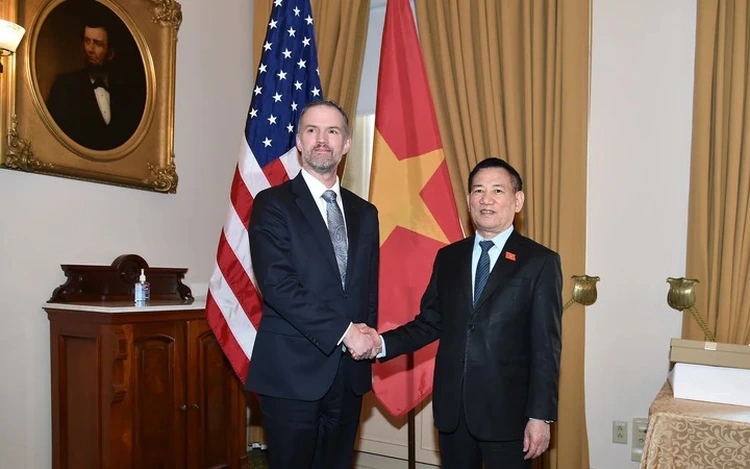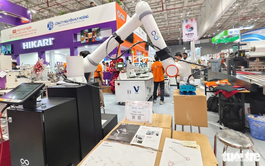
Vietnamese Deputy Prime Minister Ho Duc Phoc (R), the special envoy of Party General Secretary To Lam, shakes hands with U.S. Trade Representative Jamieson Greer at their meeting in Washington D.C., the U.S., April 9, 2025. Photo: Vietnam Government Portal
The negotiation was proposed by Vietnamese Deputy Prime Minister Ho Duc Phoc, serving as a special envoy of Party General Secretary To Lam, during a meeting with U.S. Trade Representative Jamieson Greer in Washington, D.C. on Wednesday, the Vietnamese Government Portal reported.
This meeting followed the U.S. administration's April 3 announcement of a significant 46-percent tariff on imports from Vietnam, originally effective April 9, placing the nation among those facing the steepest duties.
However, hours before the meeting, U.S. President Donald Trump decided to postpone the enforcement of the new rates on over 75 countries, including Vietnam, as these nations sought trade talks with the U.S. and had not retaliated in meaningful ways.
In this context, Phoc conveyed Vietnam's desire to work with relevant U.S. agencies to concretize the phone talks between General Secretary Lam and President Trump on April 4.
During the talks, the Party leader indicated Vietnam's readiness to work with the U.S. to reduce tariffs on American goods to zero percent, to boost imports of U.S. goods, and to facilitate U.S. investments in Vietnam.
US tariff inappropriate in bilateral relations
Phoc informed Greer that Vietnam has proactively implemented various measures to address the trade deficit between the two nations.
Therefore, he noted, the U.S. imposition of high tariffs on Vietnamese exports is inconsistent with the mutually beneficial economic and trade relations and does not reflect the nature of the Vietnam-U.S. comprehensive strategic partnership.
Despite the U.S. decision to delay the tariff imposition by 90 days, Phoc suggested that both countries should promptly negotiate a bilateral trade agreement to establish a long-term framework promoting mutual interests, aligning with the partnership formed in September 2023.
Greer appreciated Phoc's visit and recognized Vietnam's proactive and positive response to the U.S.'s new tariff policy, demonstrating Vietnam's commitment to enhancing Vietnam–U.S. economic and trade relations.
Explaining the reasons and challenges facing the U.S. economy that led the Trump administration to implement recent global tariff policies, Greer stated that the high tariffs imposed on Vietnam are due to the significant U.S. trade deficit with Vietnam.
Greer affirmed that the U.S. highly values its bilateral relationship with Vietnam and seeks close cooperation to address the trade deficit, aiming for increasingly profound relations across various fields.
Accordingly, the U.S. agreed that both sides would initiate negotiations on a reciprocal trade agreement, including tax arrangements, and suggested that technical teams from both countries commence discussions immediately.
Both parties agreed to continue working closely to promote a favorable business environment, proactively review and minimize non-tariff barriers for each other's goods, facilitate increased investment and business activities by U.S. enterprises in Vietnam, and strengthen coordination to prevent and control trade fraud.
In addition to his meeting with Greer, Phoc also met with Senators Bill Hagerty from Tennessee and Steve Daines from Montana, expressing his appreciation for their support, as well as that of the U.S. Congress in general, for Vietnam-U.S. relations.
Phoc proposed that the U.S. Congress continue to support the removal of tariffs on Vietnamese goods and the negotiations toward a sustainable bilateral trade agreement that benefits both nations' citizens and businesses.
Both senators commended Vietnam's proactive approach in addressing tariff issues with the U.S. and affirmed their support for Vietnam-U.S. trade relations based on bilateral strategic interests.
They expressed confidence that both countries would soon initiate negotiations to find solutions for economic and trade relations.



Max: 1500 characters
There are no comments yet. Be the first to comment.